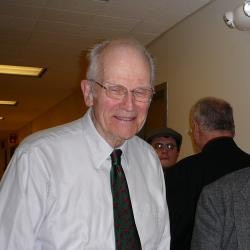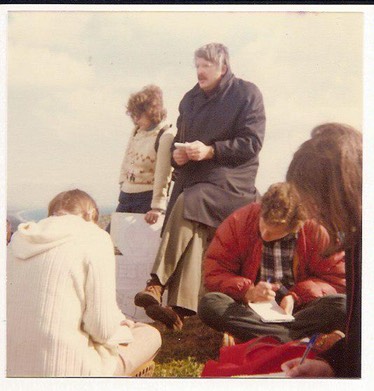Classics Professor Mark Edwards Remembered by ICCS
Professor Mark Edwards died on August 26, 2016 after a brief illness. A great friend of the Centro, Professor Edwards will be missed by all who knew him. Attached is a link to the notice from Stanford University. More details will be posted here shortly.
Centro Mourns ICCS Professor Charles Babcock
Former ICCS Professor Charles Babcock died on December 7 in Ohio. Professor Babcock was a lifelong friend of the Centro, and he will be greatly missed by his students, colleagues, and friends. The Charles Babcock Lectures at ICCS and the American Academy in Rome were established in his honor. A list of ICCS gifts made in memory of Professor Babcock is included on the Donor Honor Roll (see button above, scroll down to memorial section). An obituary is available here:

Professor Charles Babcock
Prof. Gerhard Koeppel Remembered by ICCS
Former ICCS Professor-in-Charge Gerhard Koeppel died on December 20. Professor Koeppel served as PIC from 1980-81 and 1988-90, and he is mourned by his many students, colleagues, and friends at the Centro. Professor Koeppel specialized in Roman Historical Reliefs of the Roman Empire and published a catalogue of these sculptures in the Bonner Jahrbuecher, as well as numerous other works. An obituary is available here:
http://classics.unc.edu/news-and-events/gerhard-koeppel#JUMP

Professor Gerhard Koeppel lecturing at Cosa in Spring 1981. Many thanks to Jane Stenmark Spring '81 for sending this photo.
In Memoriam: Gerhard Koeppel
In December, we were saddened by the passing of Gerhard M. Koeppel, a gentleman and a scholar who will be profoundly missed. Others have written of his brilliant intellect and well deserved scholarly accolades; I have been asked to write a more personal in memoriam for Gerhard. I am fortunate to have known him in many aspects: he was my mentor, my dissertation director, my colleague at the ICCS, and even a housemate since I lived with him in Chapel Hill for a semester after I had completed my doctorate. In each of these capacities, Gerhard was witty, charming, and kind. The combination of this generous spirit and encyclopedic knowledge was nowhere more in evidence than at the ICCS when I taught under Gerhard in 1998. It was his final time at the Centro; my first. As anyone who has taught in the program knows, it can be a stressful environment since there are so many dynamics at work. Gerhard, however, never seemed anything but calm and relaxed. He always knew what to say, where to be (and where to eat!). Although he was in his sixties at the time, none of us, faculty or students, could keep up with him. He was always at the front of the group, telling stories about the neighborhoods, the ruins, the local restaurants to whoever was able to keep pace for that moment. Gerhard loved to lecture on site and did it with an ease that was enviable. Students and colleagues alike were enraptured by his seemingly endless flow of knowledge. Perhaps more than his knowledge, however, it was his approachability that drew students to him. He loved to talk to them about anything and everything, offering them respect as individuals. It is one of the marvels of Gerhard that I don’t think that I ever heard him tell anyone that they had had a bad idea. His response to questionable ideas was simply to say “interesting” while nodding slowly and then allowing the student (or me, since I got that response more than a few times) to go and research the idea to its ultimate end, for good or ill.
In the footnotes of books and articles, Gerhard’s name appears frequently, not just as a reference source but in remarks that thank him for an idea, for reading an early draft, or for simply listening to and commenting on some budding notion. In this respect, there are many, many children of Gerhard’s intellect still populating the world. I can only hope that we emulate him in all of his facets—the intellectual, but also in the compassion, amiability, humility and the sense of contentment with which he faced the world. I will hold many memories of Gerhard, but some of the best involve the non academic moments at the ICCS: his coup of getting the entire group into and up Trajan’s column; accompanying the art history trip to Orvieto to shop for facsimiles of Etruscan bucchero (and, naturally, a good lunch); a faculty birthday celebration orchestrated by Gerhard at an obscure Abbruzzesse restaurant. And, yes, I will try to remember the factual lectures that he gave as well. Over the holidays, I had occasion to talk to several others who knew Gerhard in Rome, Chapel Hill and elsewhere. We reminisced about him and drank toasts in acknowledgement of how he had shaped our lives. As one of my companions said at the time, “terra tibi levis sit, Gerhard.”
Christopher Gregg
George Mason University